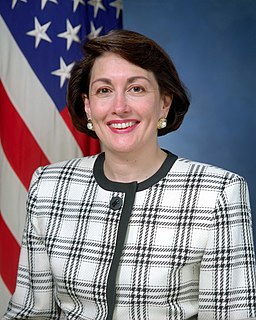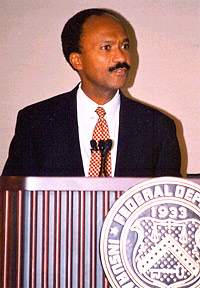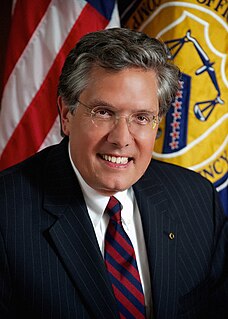The Federal National Mortgage Association (FNMA), commonly known as Fannie Mae, is a United States government-sponsored enterprise (GSE) and, since 1968, a publicly traded company. Founded in 1938 during the Great Depression as part of the New Deal, the corporation's purpose is to expand the secondary mortgage market by securitizing mortgage loans in the form of mortgage-backed securities (MBS), allowing lenders to reinvest their assets into more lending and in effect increasing the number of lenders in the mortgage market by reducing the reliance on locally based savings and loan associations. Its brother organization is the Federal Home Loan Mortgage Corporation (FHLMC), better known as Freddie Mac. In 2022, Fannie Mae was ranked number 33 on the Fortune 500 rankings of the largest United States corporations by total revenue.

Jamie S. Gorelick is an American lawyer who served as the Deputy Attorney General of the United States from 1994 to 1997, during the Clinton administration. She has been a partner at WilmerHale since 2003 and has served on the board of directors of Amazon since February 2012.

The Community Reinvestment Act is a United States federal law designed to encourage commercial banks and savings associations to help meet the needs of borrowers in all segments of their communities, including low- and moderate-income neighborhoods. Congress passed the Act in 1977 to reduce discriminatory credit practices against low-income neighborhoods, a practice known as redlining.

Franklin Delano Raines also known as Frank Raines is an American business executive. He is the former chairman and chief executive officer of the Federal National Mortgage Association, commonly known as Fannie Mae, who served as White House budget director under President Bill Clinton. His role leading Fannie Mae has come under scrutiny. He has been called one of the "25 People to Blame for the Financial Crisis" according to Time magazine.

The Federal Home Loan Mortgage Corporation (FHLMC), commonly known as Freddie Mac, is a publicly traded, government-sponsored enterprise (GSE), headquartered in Tysons Corner, Virginia. The FHLMC was created in 1970 to expand the secondary market for mortgages in the US. Along with the Federal National Mortgage Association, Freddie Mac buys mortgages, pools them, and sells them as a mortgage-backed security (MBS) to private investors on the open market. This secondary mortgage market increases the supply of money available for mortgage lending and increases the money available for new home purchases. The name "Freddie Mac" is a variant of the FHLMC initialism of the company's full name that was adopted officially for ease of identification.

The Office of the Comptroller of the Currency (OCC) is an independent bureau within the United States Department of the Treasury that was established by the National Currency Act of 1863 and serves to charter, regulate, and supervise all national banks and thrift institutions and the federally licensed branches and agencies of foreign banks in the United States. The acting Comptroller of the Currency is Michael J. Hsu, who took office on May 10, 2021.
A government-sponsored enterprise (GSE) is a type of financial services corporation created by the United States Congress. Their intended function is to enhance the flow of credit to targeted sectors of the economy, to make those segments of the capital market more efficient and transparent, and to reduce the risk to investors and other suppliers of capital. The desired effect of the GSEs is to enhance the availability and reduce the cost of credit to the targeted borrowing sectors primarily by reducing the risk of capital losses to investors: agriculture, home finance and education. Well known GSEs are the Federal National Mortgage Association, known as Fannie Mae, and the Federal Home Loan Mortgage Corporation, or Freddie Mac.

The Office of Federal Housing Enterprise Oversight (OFHEO) was an agency within the Department of Housing and Urban Development of the United States of America. It was charged with ensuring the capital adequacy and financial safety and soundness of two government sponsored enterprises—the Federal National Mortgage Association and the Federal Home Loan Mortgage Corporation. It was established by the Federal Housing Enterprises Financial Safety and Soundness Act of 1992.

John C. Dugan is an American attorney who served as the 29th comptroller of the currency from August 2005 to August 14, 2010. He has since worked as the chairman of Citigroup.

William Poole was the eleventh chief executive of the Federal Reserve Bank of St. Louis. He took office on March 23, 1998 and began serving his full term on March 1, 2001. In 2007, he served as a voting member of the Federal Open Market Committee, bringing his District's perspective to policy discussions in Washington. Poole stepped down from the Fed on March 31, 2008.

Richard H. Neiman is an American financial advisor and attorney who served as the 43rd Superintendent of Banks of New York, managing the New York State Banking Department.

The Federal Housing Finance Agency (FHFA) is an independent federal agency in the United States created as the successor regulatory agency of the Federal Housing Finance Board (FHFB), the Office of Federal Housing Enterprise Oversight (OFHEO), and the U.S. Department of Housing and Urban Development government-sponsored enterprise mission team, absorbing the powers and regulatory authority of both entities, with expanded legal and regulatory authority, including the ability to place government sponsored enterprises (GSEs) into receivership or conservatorship.

In September 2008 the Federal Housing Finance Agency (FHFA) announced that it would take over the Federal National Mortgage Association and the Federal Home Loan Mortgage Corporation. Both government-sponsored enterprises, which finance home mortgages in the United States by issuing bonds, had become illiquid as the market for those bonds collapsed in the subprime mortgage crisis. The FHFA established conservatorships in which each enterprise's management works under the FHFA's direction to reduce losses and to develop a new operating structure that will allow a return to self-management.
James B. Lockhart III is an American U.S. Navy officer, business executive, and, since September 2009, Vice Chairman of WL Ross & Co. LLC, which manages $9 billion of private equity investments, a hedge fund and a Mortgage Recovery Fund. It is a subsidiary of Invesco, a Fortune 500 investment management firm. He coordinates WL Ross's investments in financial services firms and mortgages. Lockhart serves co-chairs the Bipartisan Policy Center's Commission on Retirement Security and Personal Savings.
The U.S. subprime mortgage crisis was a set of events and conditions that led to a financial crisis and subsequent recession that began in 2007. It was characterized by a rise in subprime mortgage delinquencies and foreclosures, and the resulting decline of securities backed by said mortgages. Several major financial institutions collapsed in September 2008, with significant disruption in the flow of credit to businesses and consumers and the onset of a severe global recession.
Stephen Douglas Johnson (1963–2003), also known as Steve Johnson, was a Washington, D.C. banking lawyer; a chief lobbyist for the banking and insurance industries; U.S. House Chief Counsel for Financial Institutions and Consumer Credit from February 1995 to November 1997, the heyday of the Gingrich Revolution; and Bush Administration Senior Advisor to the Office of Federal Housing Enterprise Oversight (OFHEO) where among his varied duties he assisted the director Armando Falcon in the investigation of financial misconduct at Fannie Mae and Freddie Mac. Falcon was forced to resign in February 2003 by President George W. Bush for releasing critical oversight reports stemming from the investigation. The investigation and reports were harbingers of the worldwide financial crisis which was to occur. The forced resignation of Falcon led Johnson to resign immediately even though Bush eased up and allowed Falcon to finish his term.

Thomas James Curry is an American government official who served as the 30th Comptroller of the Currency of the United States from April 9, 2012, until May 5, 2017. Prior to becoming Comptroller of the Currency, Curry served as a Director of the Federal Deposit Insurance Corporation (FDIC) and as the chairman of the NeighborWorks America Board of Directors. He was born in Greenwich, Connecticut and raised in Stamford, Connecticut.
"Tone at the top" is a term that originated in the field of accounting and is used to describe an organization's general ethical climate, as established by its board of directors, audit committee, and senior management. Having good tone at the top is believed by business ethics experts to help prevent fraud and other unethical practices. The very same idea is expressed in negative terms by the old saying "A fish rots from the head down".

Brian P. Brooks is an American lawyer, banker, entrepreneur, technologist, and former government official. He served as Acting Comptroller of the Currency from May 29, 2020, succeeding the 31st Comptroller of the Currency Joseph Otting, until January 14, 2021. Brooks was nominated twice by President Donald Trump for a five-year term as Comptroller of the Currency, once during the 116th Congress, and once in the 117th Congress.
Collins v. Yellen, 594 U.S. ___ (2021), was a United States Supreme Court case dealing with the structure of the Federal Housing Finance Agency (FHFA). The case follows on the Court's prior ruling in Seila Law LLC v. Consumer Financial Protection Bureau, which found that the establishing structure of the Consumer Financial Protection Bureau (CFPB), with a single director who could only be removed from office "for cause", violated the separation of powers; the FHFA shares a similar structure as the CFPB. The case extends the legal challenge to the federal takeover of Fannie Mae and Freddie Mac in 2008.













